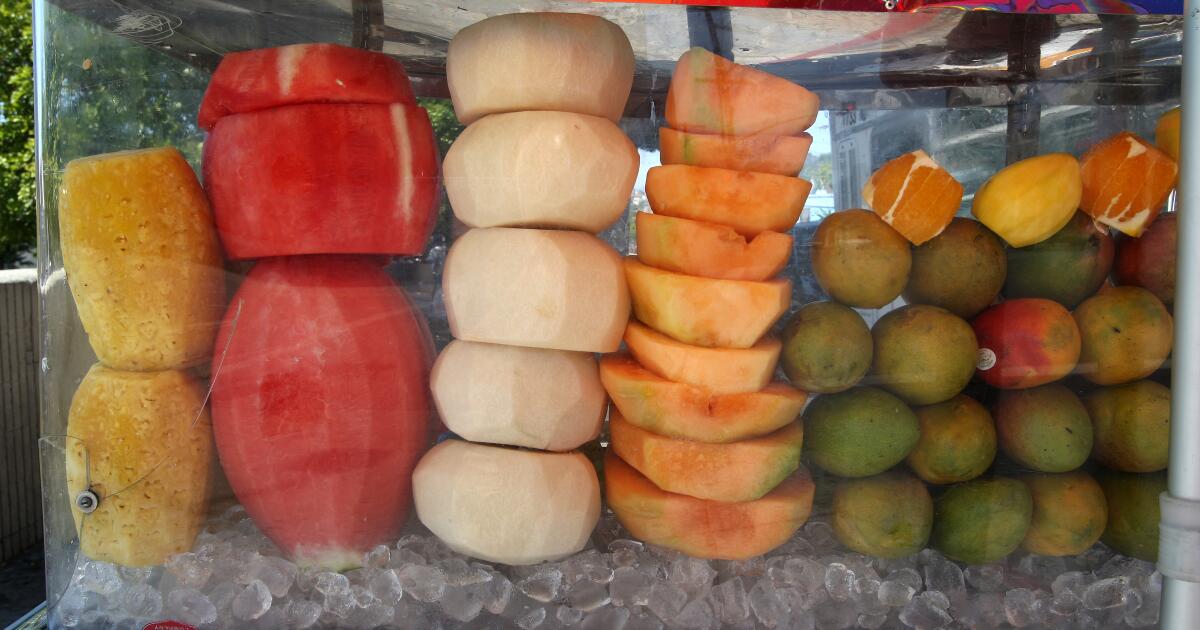The Instagram message I sent went this way: Querido Ivan, ¿Dónde estás? Llevo un par de semanas preocupado por ti. ¿Dónde estás?… Dime que estás pasando desapercibido. … Dime que no estás en la cárcel ni en un centro de detención de mala muerte. O en el México cuerdo.”
Ivan is the guy who sells cocos frios — cold coconuts — and watermelon, pineapple and mangos from a cart on an L.A. corner I pass by most days. For nearly a year, whenever I saw his bright rainbow umbrella, my mouth started to water. My usual order: two large chopped watermelon cups — one plain for my girlfriend, and one with a splash of chamoy and tejate, for me — handed over by Ivan or his little brother with a “Here, my friend.”
Sounds dangerous right? Like Ivan and his brother are criminal masterminds?
Since the second week in June, as ICE, Homeland Security, the National Guard, the Marines and who knows who else took to the streets all masked up, war-fighting ready, and started disappearing Angelenos, I’d been worried about Ivan. Where was he?
Hence the Instagram. I identified myself as tu amigo Miguel, the “tipo” in the black Acura with the two-watermelon usual.
“Te extraño,” I said. I missed him and the watermelon. I said I hoped he was desapercibido — lying low — and not in a sleazy detention center or back in Mexico, which at least is a sane country.
That lying low would be the best-case scenario for Ivan and his brother was absurd. Two guys providing Los Angeles with iced fruit were probably on the lam, unable to earn a living because the president of the United States thought “real Americans” wanted their cocos frios cart.
I told my friend Lance about Ivan’s vanishing act. This was his response:
“My youngest son, Chris, went to Cal State Northridge and got his degree in chopping fruit, but he couldn’t find a job, so he went to Stanford and got a master’s in cocos frios, but still no jobs. Now, thanks to Donald Trump, my boy is going to be on the corner chopping fruit. Finally.”
Into July, still nothing from Ivan. Finally, out of town on vacation, I heard back.
“Hola, amigo, estamos bien, muchas gracias habiamos.” One family member was taken, “pero ya estamos bien” and “cuanto se calmen los cosas … estaremos.” “But we’re fine” and “when things calm down, we’ll be back.”
But when? “A lot of ICE,” he Instagrammed. “A lot of la migra.” Not yet.
Days went by. Then on Monday, still out of town, I hear my phone’s “handoff” tone. A friend texted me a picture of the rainbow umbrella: “Your watermelon man is back on his corner.”
I tried Ivan. He messaged right back. I’ll save you the Spanish:
“Hello, good evening. I’ll be waiting for you here. In the meantime, continue enjoying your lovely trip. Thank you very much. I really appreciate it.”
Who is this menace to society trying to fool?
I owe Ivan $16. I didn’t have cash for my last order in early June. Next week, I’ll pay up beneath that beautiful rainbow umbrella. And get two more cups of watermelon to go.
Michael Krikorian is a former Times staff writer. KrikorianWrites.com
Insights
L.A. Times Insights delivers AI-generated analysis on Voices content to offer all points of view. Insights does not appear on any news articles.
Viewpoint
Perspectives
The following AI-generated content is powered by Perplexity. The Los Angeles Times editorial staff does not create or edit the content.
Ideas expressed in the piece
- Community members emphasize the psychological toll and economic disruption caused by ICE raids, with street vendors like Ivan facing “terror” and fearing deportation while working. Many have stopped vending or gone into hiding, reducing income and threatening families’ stability [1][5].
- Street vending’s economic role is highlighted, contributing $504 million annually to LA’s economy and employing 50,000 workers, mostly Latinx women. arrests have forced businesses to close and revenue to drop sharply [3][5][6].
- Solidarity efforts have emerged, including grassroots fundraising campaigns like the LA Street Vendor Solidarity Fund and actions like “buying out” vendors’ inventory to support them financially. These efforts reflect long-standing mutual aid traditions in the vendor community [5][6][7].
- Advocacy groups call for legislative solutions such as SB 635, which would protect street vendor data from being shared with ICE. Leaders critique federal raids as violating the rule of law and targeting immigrant communities indiscriminately [4][6].
- Long-term societal damage is feared, including fleeing workers’ inability to sustain families or access healthcare, and the erosion of trust in public spaces and institutions [1][2][4].
Different views on the topic
- Federal enforcement policies prioritize immigration control regardless of community impact, with ICE agents conducting raids in workplaces, public areas, and residential zones. The agency has declined to comment on the economic and human consequences of these operations [3][5].
- No confirmation of due process has been provided by authorities, as reports describe arrests without probable cause, lack of identification from plainclothes agents, and EPredient removal of individuals to undisclosed locations [1][6].
- Discrepancy between policy rhetoric and practice is noted, as undocumented workers contribute significantly to state revenues (e.g., $23 billion annually in California) while being targeted as threats to public safety [2][4].
- Limited formal relief mechanisms exist for affected vendors, forcing reliance on private donations and informal aid networks despite their critical role in the local economy [5][6].

